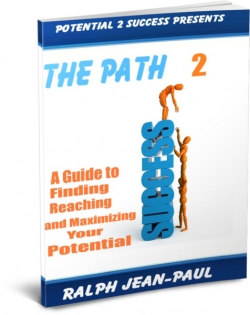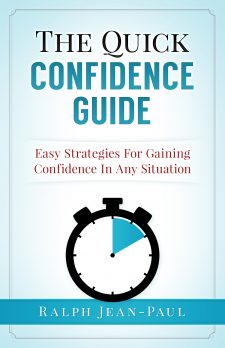In life, we will all face problems. Some of the problems will be small and pesky, others will be giant and intimidating. I think we can all agree that no matter the size of the problem, we always want them gone.
Throughout my years working for a financial institution, and now as an entrepreneur, one of my goals has always been to not let little problems stop me and to conquer my biggest problems quickly. I learned that not all problems can be eliminated swiftly. There are some issues that we face that can only improve over time. But it was always my goal to understand which issues required me to be patient and which issues I could solve now.
In this post, I will show you how to solve your bigger problems in less time.
Solving Big Problems Also Solves Small Problems
My digital media startup recently launched our first product this month. Up until this point, my startup has generated income through corporate sponsorships and partnerships. But now, I decided that it was time to launch a product which is a completely different beast.
When you launch a product for the first time, there are a lot of problems to solve and questions to answer? Should we set up third party online shopping carts, build our own online store, or use an online marketplace like Amazon.com? How early should we start marketing? Who is our target market? What would make this launch a success? And on and on and on.
Each step of the product launch process had its own big problem to solve. Each with a completely different solution. During the process, I was determined to avoid letting little problems trip me up. What I learned was if I focused on the big problems the little problems solve themselves! More times than not, solving big problems usually created a solution for the little problems.
The idea of solving little problems by solving big problems also works in other aspects of life. Solving the bigger problem of a lack of confidence in yourself also solves the problem of the fear of taking risks that can move your life forward. Dealing with the big problem of your philosophy of money will help solve the small problem of a low bank account balance. Identifying and solving the problem of unhealthy eating will give you more energy to wake up early, get physically fit, or just have the energy and vitality it takes to accomplish any goal.
This mistake many people make when trying to solve small problems is that they focus only on the small problems. Not the bigger and more difficult issues that create or perpetuate the small problems. This is why I believe solving bigger problems should hold a high priority in your life. And the sooner you can solve those big problems, the better.
How to Spend Less Time on Big Problems
Create a Sense of Urgency
If you’ve ever had to finish something in a hurry, you know that there is little time to think. When something has to get done, we tend to think less and act more. Maybe your boss needed an assignment done immediately. Or maybe when you were in school you had a project due and had to stay up all night to finish it. Creating that same sense of urgency can force you to take action in all parts of your life.
You see it all of the time in commercials and sales promotions. They offer deals and specials that are available “for a limited time only” so that we will be forced to act on the offer. When we want to buy something we can sometimes procrastinate on the decision. We don’t think of it as procrastination though. We’re just “thinking it over”. That is why advertisers like to create urgency by limiting availability.
You can create the same sense of urgency on whatever it is you want to do. Set strict deadlines on the actions you need to take. With those deadlines, create consequences for missing those deadlines and rewards for meeting them. I will often create a sense of urgency by reminding myself of how good it will feel when I accomplish what I am trying to do.
I will also deny myself something if I do not meet the deadlines and reward myself if I do. Maybe I won’t eat some of my favorite foods for a while until I take a series of actions towards my goal. I will also reward myself with a fun night out with friends or an extra relaxing weekend if I “do” more than “think”. But, you must be very disciplined in your rewards and consequences. For me, it’s no work, no play.
Know What You Cannot Do and Rule Out “Non-Options”
One of the best ways to solve big problems faster is to not spend time on things that won’t make the situation better. This means you must first rule out what you should not be doing.
Sometimes the problems we face are of our own creation. Other times, it is out of our control. Identifying which is which is an important part of the problem-solving process.
For example, you cannot go back in time and change what created the problem. Even though we all have a moment in time that we all wish we could revisit and alter in some way, unless time travel is mastered in our lifetime, the past is the past. Since we can all agree that going back and fixing the problem is impossible, there’s not a lot of benefit focusing on a solution that you are not going to pursue.
With your big problem, there may be many things that are just not reasonable to consider. It may be unreasonable for you to solve an immediate money issue by quitting your job tomorrow and applying to law school, becoming a lawyer, and eventually, a judge that presides over a high-profile case in which you become famous and write a best selling book. That doesn’t mean that you will never be able to do that (if that’s your dream I’m not here to judge), but it does mean that it will not solve your problem in a short amount of time.
When ruling out non-options, it’s a good practice to establish for yourself things that you will not do while solving your big problems. That means habits, thoughts, and actions that will not make the situation better and may actually hurt your problem solving process.
When I worked in personal finance, one of the common mistakes I witnessed most people who are not good with money make was their tendency to spend their last bit of money on something that made them feel good but hurt them financially. For example, if they only have $10 left, they will decide to spend it on entertainment or food because it makes them feel better about their situation. Even though there is nothing wrong with spending money on entertainment or food, they are not helping their financial situation by spending that money when they could not afford to do so.
Take note of the things that you may be tempted to do that may slow down your ability to solve your problem quicker. Face these things head on and move past them as soon as you identify them. This will get you on track towards a solution instead of being stuck in the realm of difficulty.
Focus On What You Can Do and Start Immediately
Once you’ve gotten past the things that you are not going to do, it’s time to focus on what you can do. Having a solution mindset is a precursor to generating innovative problem solving ideas.
Focusing on what you can do and start immediately means that you will find out what does not work quicker. Humans like to think. Thinking is good. But many times, when people are trying to find a solution to a problem, humans like to think and theorize about the solution instead of applying the solution.
Why do we do this? Mostly because of one fear: “what if it doesn’t work?” Have you ever said that to yourself or someone else? This fear is closely tied with a fear of failure. And the fear of failing is a very common feeling for humans to have.
However, failing is not the end but the beginning. And, the sooner you can fail, the sooner you will find a solution. When I had the idea for my product last year, I could have spent all of this year thinking about how to make it better, how to make sure it sells, and how to avoid mistakes. Or, I could have worked hard on making it great, and then launching it and learning from that experience. I chose to launch.
Now that I have successfully launched, I can see if all of my theories were true. If I would’ve waited until next year to launch, I would’ve lost a ton of time “figuring things out” and would have just delayed proving what I believed would work. If my theories were wrong, it would’ve made things worse by waiting a year to find that I was wrong. Imagine taking an exam and waiting a year to find out if you passed. By not taking action right away, you are essentially doing the same thing.
You are also delaying the possibility of success. If there are things you can do now, and those things will solve the problem, you are keeping that problem around longer than it needs to be there by not taking action. Sometimes we are so closer to accomplishing what we want than we think we are. Focusing on what we can do will inch us closer to our accomplishments.
Turn Stress Into Excitement
When people are in a new situation there is always a level of anxiety or stress. However, all stress is not bad stress. Being excited is a type of stress called eustress which is a positive type of stress. While being nervous can make you react badly to your situation, eustress can motivate you and boost your performance.
Athletes do this all of the time. Before a big game or competition, athletes will often use their nervous energy to boost their athletic performance. In high school I would always worry before a basketball game. I would wonder, “what if I miss all of my shots tonight? What if I every time I try to dribble the ball, it gets stolen?”
Then, I would begin to think of what I could do to prevent those things from happening. The more solutions that I came up with, the more excited I would become. That excitement made me perform better and more relaxed.
Good things happen when you are excited about a situation. If you can turn your stress and nervousness into excitement, you will actually begin to look forward to doing things that you used to be nervous about.
The “20 Solutions” List
One of the best practices to adopt is creating a list of solutions to your problem. Doing this will help unclutter your mind as well as help you solve your big problem.
I suggest creating a list of 20 solutions. Writing down 20 will cause you to stretch your thinking so that you are only focusing on what can be done to fix the problem. From there, I suggest you start with doing the things at the bottom of the list.
Most likely, you put the easiest action items on the top of your list. The harder and more difficult solutions tend to round out your list. Working your way from the bottom up will force you to do the things that you are avoiding. Taking these steps will ensure that you are not self-sabotaging yourself by trying to take the easy way out.
Conclusion
I suggest you bookmark this post and use these suggestions the next time you come across a big problem in your life. Problems come and problems go. But some can go sooner if you take the right steps.


 Subscribe for free today and get a FREE copy of my ebook The Path 2 Success. Begin your path today!
Subscribe for free today and get a FREE copy of my ebook The Path 2 Success. Begin your path today!










